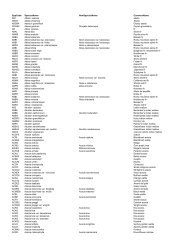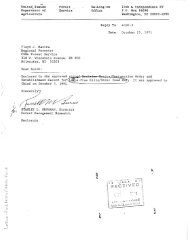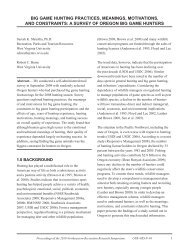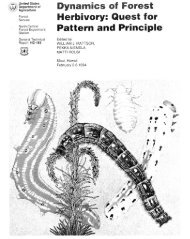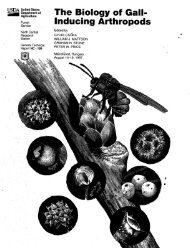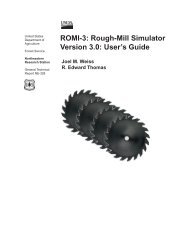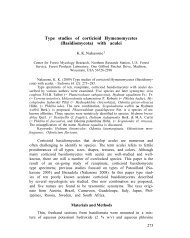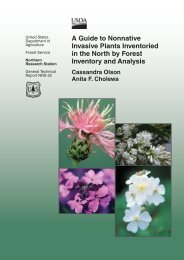Proceedings of the 2009 northeastern recreation research symposium
Proceedings of the 2009 northeastern recreation research symposium
Proceedings of the 2009 northeastern recreation research symposium
Create successful ePaper yourself
Turn your PDF publications into a flip-book with our unique Google optimized e-Paper software.
Table 4.—Divers’ perception <strong>of</strong> impacts to reefs by specialization<br />
(7-point scale)<br />
Specialization Level<br />
Least Moderate High F-ratio P-value<br />
Impact Questions 1<br />
Water quality 4.22 4.17 4.23 0.112 0.894<br />
SCUBA diving 3.89* 4.12 4.19 2.879 0.057<br />
Commercial fi shing 2.78 2.85 2.61 2.846 0.059<br />
Hurricanes 2.48 2.46 2.46 0.016 0.984<br />
Snorkeling 3.84 4.03 4.00 1.649 0.193<br />
Recreational fi shing 3.39 3.39 3.20 2.269 0.104<br />
Global climate change 2.82 2.72 2.77 0.353 0.703<br />
BOLD = signifi cantly different (α = 0.05) using Tukey’s test. * = Signifi cant<br />
difference between least and high.<br />
Table 5.—Divers’ perception <strong>of</strong> impacts to reefs by specialization (5-point scale)<br />
Specialization Level<br />
Least Moderate High F-ratio p-value<br />
Reefs are able to recover easily from<br />
commercial fi shing damage<br />
2.06* 2.06 1.82 7.095 0.001<br />
Snorkelers/divers cause some damage 3.38 3.28 3.37 0.869 0.420<br />
Recreational anglers cause some damage 3.50 3.39 3.40 1.054 0.349<br />
* = Signifi cant difference (α = 0.05) between least and high.<br />
to 7 (extremely positive impact). Th e impacts were a<br />
mix <strong>of</strong> environmental and anthropogenic factors (see<br />
Table 4). Th ere were two signifi cant diff erences between<br />
specialization groups. Th e least specialized divers gave<br />
SCUBA diving a signifi cantly lower impact rating than<br />
did more specialized divers (p ≤ 0.057) (Table 4). Highly<br />
specialized divers perceived commercial fi shing as having<br />
a signifi cantly more negative impact (p ≤ 0.059).<br />
Finally, participants were asked <strong>the</strong>ir level <strong>of</strong> agreement<br />
with statements about reef impacts on a scale <strong>of</strong> 1<br />
(strongly agree) to 5 (strongly disagree) (Table 5). Most<br />
<strong>of</strong> <strong>the</strong> answers were consistent across specialization<br />
levels. Th ere was a signifi cant diff erence (p ≤ 0.001)<br />
by specialization level for commercial fi shing; less<br />
experienced divers were more likely to think that<br />
commercial fi shing causes damage. Th e data thus did<br />
not support <strong>the</strong> hypo<strong>the</strong>sis that highly specialized divers<br />
would rate impacts more negatively than less specialized<br />
divers, except in <strong>the</strong> case <strong>of</strong> perceptions <strong>of</strong> commercial<br />
fi shing impacts.<br />
4.0 CONCLUSION AND IMPLICATIONS<br />
Th e divers’ survey data provide limited support for<br />
<strong>the</strong> initial hypo<strong>the</strong>sis that because <strong>of</strong> higher resource<br />
dependence and greater level <strong>of</strong> mediated interaction,<br />
highly specialized divers are more likely to rate reef<br />
conditions as less acceptable, more degraded, and highly<br />
impacted. Th e fi rst question on <strong>the</strong> survey presented<br />
hypo<strong>the</strong>tical situations <strong>of</strong> varying resource quality;<br />
responses showed <strong>the</strong> greatest disparity between <strong>the</strong><br />
specialization levels, as compared to <strong>the</strong> questions based<br />
on observation. High levels <strong>of</strong> algal cover and coral that<br />
was mostly white, 60 percent white, or 30 percent white<br />
were signifi cantly less acceptable to more specialized<br />
divers. A suggested explanation for this response is that<br />
highly specialized divers, having experienced a wider<br />
variety <strong>of</strong> conditions, are better able to envisage <strong>the</strong><br />
diff erence between 60 percent and 30 percent algal cover<br />
and <strong>the</strong>refore are more able to distinguish between <strong>the</strong><br />
suggested scenarios. More specialized divers were also<br />
signifi cantly more concerned about seeing no fi sh or<br />
few fi sh compared to less specialized divers. In terms <strong>of</strong><br />
<strong>Proceedings</strong> <strong>of</strong> <strong>the</strong> <strong>2009</strong> Nor<strong>the</strong>astern Recreation Research Symposium GTR-NRS-P-66<br />
28




